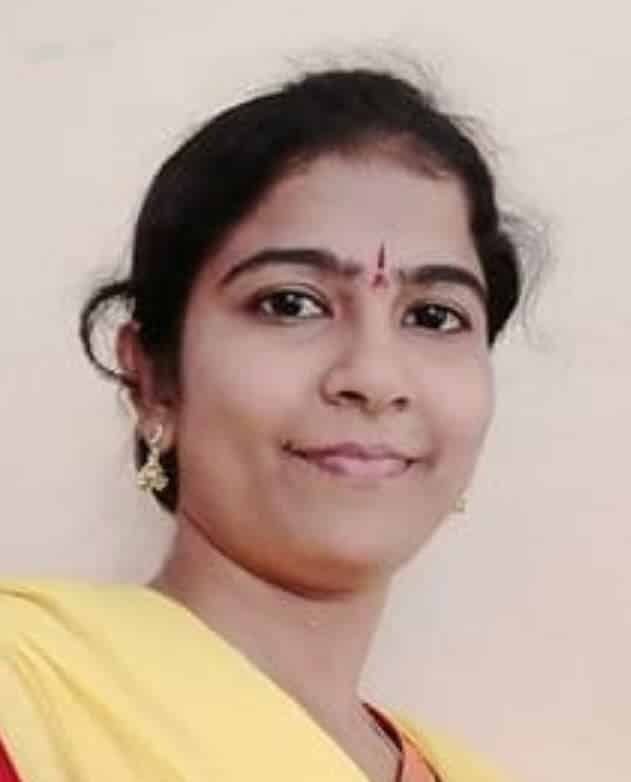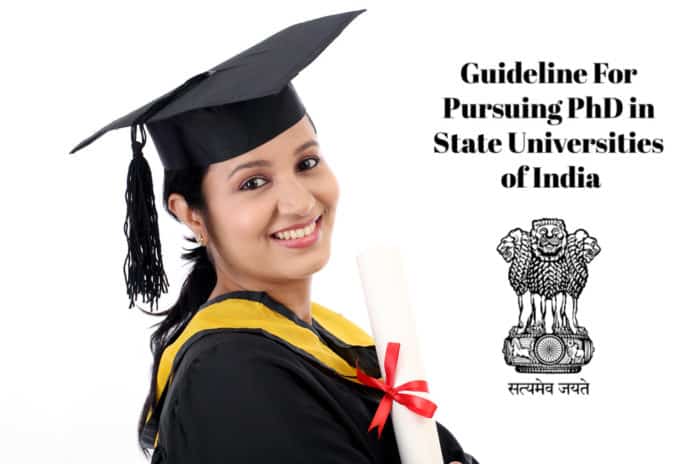Guideline For Pursuing PhD in State Universities of India
Planning for a PhD in State Universities of India? Then you must go through these essential guidelines before you start. State Universities are defined as the universities that are funded and run by the state government and now they became the joint responsibility of both the Central and the State government, following the constitutional change in 1976. There are 251 State Universities including both public and private Universities of which, the UGC has been making budgetary plan allocation for 123 state universities facilitating creation, augmentation and up-gradation of infrastructural facilities. In general, a PhD follows master’s degree and takes four to five years for completion in many State Universities. All the state Universities follow rules and regulations framed by UGC, India for PhD admission, allocation of Research Supervisor, coursework planning and evaluation of PhD thesis based on Standards and Procedures.
Students who plan their PhD studies in State Universities can perform their doctoral research in the well-sophisticated research environment and meet researchers with high expertise in nearly all scientific disciplines. Here are certain Guideline For Pursuing PhD in State Universities of India
- Who must submit a NOC (No Objection Certificate)?
There shall be two broad categories of candidates who are expected to submit NOC during PhD application.
Full-time PhD programme: In case of candidates who are applying for Full-time PhD application and have passed their qualifying examination from other Boards / Universities, they need to obtain eligibility certificate from the Registrar of the proposed University, before granting admission to them.
Part-time PhD programme (External): Candidates working in reputed industry/organization having R & D facilities and Government Research Laboratories where the research work of the candidate can be officially sponsored by the employer are considered under this category. At the time of PhD admission, such candidates should provide NOC from the employer expressing their willingness
- to pay full salary to the candidate
- to relieve the candidate to complete the PhD research requirement
- to permit a candidate to avail the research facilities available at the organization
Part-time PhD programme (on Campus): Candidates working in Govt./Govt. Aided Engineering Colleges and Polytechnic Colleges Govt/Govt. aided/ private Engineering/Technology colleges or Science and Arts Colleges/ Universities shall produce No Objection Certificate from the Head of Institution for PhD registration.
Additional certificates required in case of candidates applying for Part-time PhD programme.
- Relieving certificate from the employer – to relieve the candidate to complete his/her residential requirement
- Experience certificate from the employer – to state the number of years a candidate is working with the employer.
- In the PhD entrance test, what subject will I be tested in and what is the difficulty level?
As per UGC regulations, all the State Universities, deemed to be Universities and affiliated colleges shall conduct an Entrance test followed by interview for the admission of PhD programme. Entrance test pattern and selection criteria can be decided by the individual University.
- The entrance test which will be conducted by the respective Department and the syllabus for the written test differs for various specializations based on the department the candidate is applying for.
- The Syllabus of the Entrance Test will consist of 50% of research methodology and 50% shall be on subject specific to the Department to which the candidate is applying.
- In certain State Universities, for candidates applying for interdisciplinary research, the Entrance Test will be a common Entrance test with general paper and its syllabus will be framed by the interdisciplinary Board of Studies.
- A minimum cumulative mark of 50% is fixed for selection based on the candidate’s performance in the Entrance test, Qualifying exam and Interview.
- There shall be a slight change in the minimum qualifying mark in the entrance test where it is 55% in the University of Mysore.
- Some universities follow the ranking system and many other criteria to evaluate the performance in the entrance examination. For example, Pondicherry University considers candidates who score more positive marks with less negative marks in the entrance examination.
- I have completed M. Phil. Will I be exempted from the Entrance Test?
As per the UGC regulations, the particular University may decide separate terms and conditions for those students who qualify CSIR/UGC JRF/ NET/SLET/ GATE examinations or have passed M.Phil programme with respect to the entrance test.
In general, candidates who qualify examinations or have M.Phil degree are exempted from entrance test in many State Universities. There are different terms and conditions in various Universities.
- No exemption for candidates with M Phil degree and exemption only for candidates who have qualified UGC, UGC-NET (including JRF)/UGC-CSIR NET (including JRF)/SLET/teacher fellowship –
- The exemption only from written test and not from the interview for candidates with M.Phil and who have qualified competitive exams – University of North Bengal
- Exemption for candidates who have obtained M.Phil from the same University and not for candidates who have obtained a M.Phil degree from other Universities.
- How is a research topic/ preliminary research idea decided?
- A Research Advisory Committee (Doctoral Committee), for each Ph.D. scholar, will be formed comprising of Supervisor, Head of the Department, Co-Supervisors in case of interdisciplinary research and subject experts to review the research proposal and finalize the topic of research.
- This committee will guide the research scholar to develop the study design and methodology of research.
- This committee will periodically review and monitor the progress of the research work of the research scholar.
- Does University provide any Hostel facility to a PhD scholar?
Yes. Hostel facility is available for both men and women in almost all State Universities except a few like Anna University, Chennai. Based on the availability of rooms, hostel accommodation shall be provided to the PhD scholars.
- How is a Guide and Co-Guide decided?
- The allocation of Research Supervisor for a selected research scholar shall be decided by the Department concerned. It depends on the research interests of the scholars, number of scholars per Research Supervisor and the available specialization among the Supervisors.
- In case of topics which are of interdisciplinary nature, the concerned Department may appoint a Research Supervisor from outside the Department as Co-Guide with the approval of Institutional Research Board.
- Note – It is recommended to get the acceptance from a Research supervisor prior to the official processes.
- How many Guides am I allowed to work with?
You are allowed to work with only one guide. In case of interdisciplinary research and if the Supervisor retires from the service, a Joint-Supervisor/Co-Guide who is a subject expert can also be included.
- Do I need to approach the potential supervisor myself?
Yes, that is the preliminary step. Based on your research interest, you have to approach a supervisor.
Consent from a recognized supervisor from a recognized department is mandatory to consider the application for admission to Ph.D. programmes. PhD application without the consent of the Supervisor shall be summarily rejected.
- What are the criteria for Exemption from the Course work?
As per UGC regulation, the coursework shall be treated as pre-PhD preparation and a PhD student after admission should undertake a coursework for a minimum period of one semester. A course must include a course on Research Methodology which may involve quantitative methods and computer applications.
A coursework includes
- Research Methodology – quantitative methods, computer applications, research ethics and review of published research in the relevant field, training, field work, etc.
- Advanced level courses in the subject concerned
- Background paper relating to candidates’ PhD work
- Special electives – specific to the area of research recommended by the Doctoral Committee
In relevance to Exemption criteria from coursework,
- Candidates already holding M. Phil. Degree from the same University is permitted to proceed to the Ph.D. without coursework.
- Scholars with M.Phil. Degree in the Faculty of Science and Humanities have been exempted from course works only when the M.Phil. A degree is related to the proposed Ph.D. research work and when it is recommended by the Doctoral Committee.
- Candidates having M.Phil degree from a different institution and in an interdisciplinary subject may need to undergo the coursework.
- M.Phil. Degree obtained through Distance/Correspondence/ Open University System is not considered for exemption of course works.
- In integrated PG and PhD Degree, Candidates may be exempted by the Department from the PhD coursework.
- All other candidates admitted to the PhD programme shall be required to complete the Ph.D. coursework prescribed by the Department.
- Is a transfer to/ from another University possible during the course of PhD program?
- The candidates pursuing their Ph.D. with one University can transfer their registration to certain State Technical Universities like Anna University of Technology (Madurai) for which the candidate’s existing status regarding the coursework, confirmation of registration and duration of study shall be considered and suitably upheld at the discretion of Vice-Chancellor.
- Transfer of Ph.D. candidate from one Supervisor to another Supervisor can be accomplished with mutual willingness granted by both the present and proposed Supervisors.
- For a change of supervisors, documents including No Objection Certificate from the present supervisor, Willingness certificate from the proposed supervisor and the details of scholars currently pursuing research under the proposed supervisor are necessary.
- As per UGC announcement on 2016, women PhD candidates are allowed to transfer the research data to the University where she relocates from the parent University because of marriage without any hurdle. In such a case, it is mandatory to give credit to both the parent University as well as the University where the female candidate relocates.
- Is it mandatory to publish a research paper before submitting the thesis for award of PhD degree from this Institute/University?
Yes, it is mandatory to publish at least one research paper in a refereed journal before the submission of the thesis as per UGC guidelines. In certain Universities like the University of Madras, it is mandatory to publish two research papers in case of Science discipline in a refereed journal.
- Am I expected to teach while pursuing PhD at this Institute/University?
Not mandatory. However many Universities will support the PhD scholars involving in teaching with Teaching Research Fellowship.
- Will I be selected for the written test/interview if I meet the eligibility criteria?
- The admission is entirely based on merit basis.
- The research board shall screen the applications as per the eligibility norms and the candidates who meet the eligibility criteria will be called for entrance test followed by an interview.
- 50%-55% of marks from the qualifying examination, i.e. PG Degree and another 50% based on entrance examination comprising of both written test and interview shall be considered for the selection of candidates for PhD candidates.
- How many seats are there for PhD admission this year?
It depends on the number of PhD students under an individual Research Supervisor.
- A Professor can guide a maximum of eight (8) Ph.D. scholars.
- An Associate Professor can guide up to a maximum of six (6) Ph.D. scholars
- An Assistant Professor can guide up to a maximum of four (4) Ph.D. scholars.
- What do I need to do other than filling up the online form? Do I need to post a print out of the application form? Do I need to post a copy of my certificates, mark sheets, etc.?
Application form can be downloaded from the University website and filled-in form should be sent to the University administration along with certificates and mark sheets.
In some Universities, an online application needs to be duly filled in, to be printed, and to be duly signed by the concerned Scholar, Supervisor, HOD of Supervisor and Joint Supervisor if any and to be sent to the University along with the photocopies of certificates and mark statements
- I have done my M.Sc in botany, but I have a research project proposal in Microbiology, will I be eligible?
Yes, you can apply. If both the subjects of the candidate’s post-graduate degree and the discipline of the department in which the candidate is applying for his/her doctoral research are different, then their PhD degree will be mentioned as “interdisciplinary”.
To conclude, by joining in a State University, PhD Students can work with highly educated and experienced faculty advisors who extensively help them navigate a problem, provide training in research methods and ultimately guide in writing research results. The primary output of any PhD student is to publish research papers that disclose new results and discoveries made by the students during the course of their PhD research. Since it is mandatory to publish research papers, PhD in State Universities can improve the chance of wider recognition and contribution to the scientific community for any PhD research Scholar. Also, India has a growing demand for researchers who are necessary to drive the country to the forefront of innovation and excellence.
Check Out Our Career Advice Section For More Such Insights
 Above mentioned guidelines for PhD admission in state universities of India has been compiled by Dr. Revathi, an eminent professor & influencer at Biotecnika. With a specialization in Biomedical Genetics & Cancer Genetics, Dr. Revathi has a vast knowledge about how the PhD Admission system works in India. Stay Tuned! She will be back with another useful article soon!
Above mentioned guidelines for PhD admission in state universities of India has been compiled by Dr. Revathi, an eminent professor & influencer at Biotecnika. With a specialization in Biomedical Genetics & Cancer Genetics, Dr. Revathi has a vast knowledge about how the PhD Admission system works in India. Stay Tuned! She will be back with another useful article soon!Keywords: PhD in State University, Apply for PhD in State Universities of India, PhD Application guidelines, How to Apply for PhD in State Universities of India, PhD Guideline for State University, How to Apply for PhD.Guidelines For Candidates Planning for PhD in State Universities of India.






































